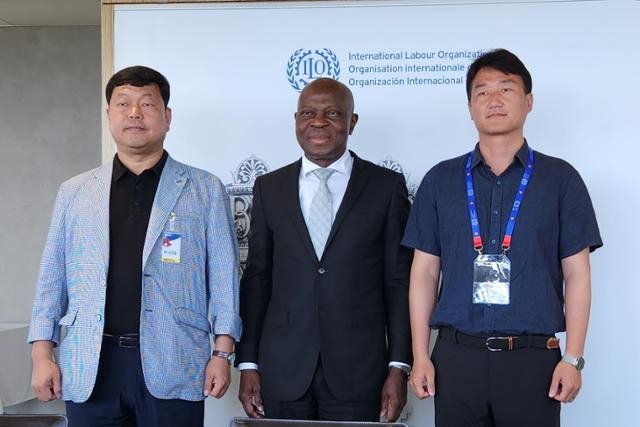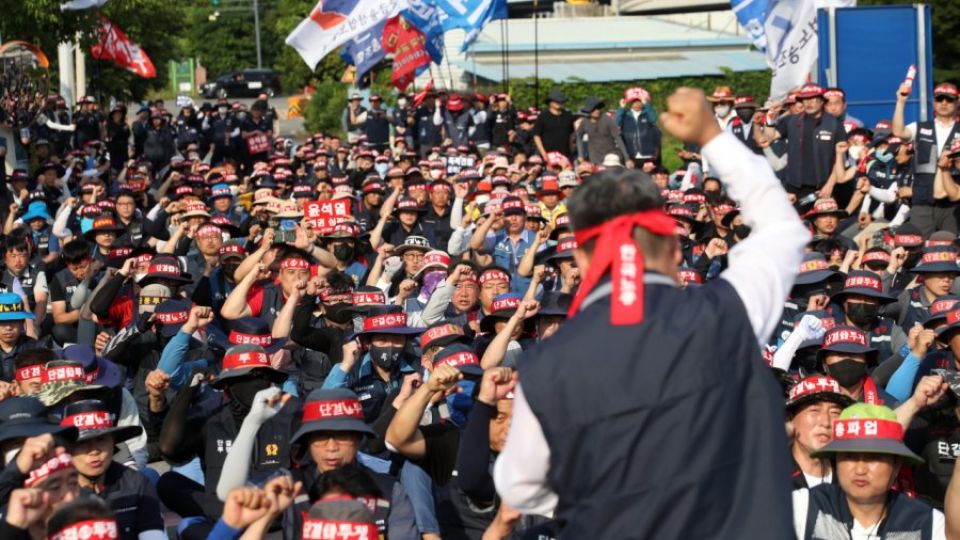June 14, 2023
SEOUL – The confrontation between Korean labor and the government reached new heights on Tuesday, as unionists took their concerns that President Yoon Suk Yeol has been suppressing labor unions here to the International Labor Organization’s general assembly in Geneva, Switzerland, while the presidential office opened a public debate over the legitimacy of nighttime labor protests.
“The Constitution recognizes the freedom of assembly and association as citizens’ basic rights, and the citizens have continuously been given greater freedom to do so,” read the statement by Yoon’s office.
“But in recent times, there are growing calls to navigate a balancing point as citizens and society are suffering an excessive level of inconvenience,” the statement continued.
A legal gray zone over the matter of assemblies after sunset and before sunrise has long existed in Korea, Yoon’s office claimed, despite a ruling in 2009 that found the nation’s effort to restrict nighttime protests unconstitutional. Yoon’s office argued that the parliament has fallen short of reaching a compromise on follow-up legislation. The three-week public debate will start Tuesday.
This statement came soon after it was revealed that a complaint against Yoon’s anti-union approach was filed with the Committee on Freedom of Association at the International Labor Organization, headquartered in Geneva.
The chiefs of the two umbrella unions here — the Federation of Korean Trade Unions and the Korean Confederation of Trade Unions — held talks Sunday local time with ILO representatives during the 111th general assembly in Geneva, hosted by the United Nations agency.
According to the unions, KCTU President Yang Kyeung-soo told ILO Director-General Gilbert Houngbo that the labor-management relationship is at its worst in three decades, urging the ILO to take necessary actions against Yoon.
Yang also criticized the Yoon administration for failure to implement ILO’s recommendation over the freedom of association and rights to collective bargaining, calling the act “a repudiation of the ILO conventions.”
FKTU chief Ryu Ki-seop said at the meeting that the Yoon administration is trying to adopt management-friendly policies such as workweek extension and permission for an employer to hire new employees to take the place of those who stage a walkout, without listening to the voices of the trade unions or seeking a social consensus.
Houngbo said in the meeting that a procedure was underway to deal with a complaint about the Yoon administration’s suppression of Korea’s labor unions, adding he was keeping close tabs on Korea’s situation, by which he was “very alarmed,” according to the FKTU in a statement.

This photo shows FKTU chief Ryu Ki-seop (left) and KCTU President Yang Kyeung-soo (third from left) posing with ILO Director-General Gilbert Houngbo during the talks held Sunday in Geneva, Switzerland. (Courtesy of FKTU)
A Korean business lobby group also participating in the ILO general assembly, however, refuted the labor unions’ claims.
Lee Dong-geun, vice president of the Korea Enterprises Federation, said in a speech Monday that the labor union’s argument about the government’s union crackdown is “not factual,” and instead the society is reaching a consensus that the illegal activities by labor unions cannot be tolerated, according to the Korea Enterprises Federation in a statement Tuesday.
Lee also stressed the need for social consensus over the pro-labor law revisions, such as one to prevent the employer from suing employees whose illegal participation in walkouts incurred financial damage of the employer, which would otherwise aggravate industrywide confusion.
Since his inauguration in 2022, Yoon has taken a hard-line stance against labor unions, reiterating pledges not to compromise with allegedly unlawful acts and not to hesitate to go by law and principle.
Tension erupted in the truckers’ strike in November 2022, as the truckers have called for a permanent guarantee of minimum freight rates. The weekslong strike clogged the nationwide supply chain in industries like cement manufacturing, resulting in over 3 trillion won ($2.4 billion) of losses that the country had to burden.
Yoon then blamed the truckers’ labor union for “taking the livelihoods of ordinary people and the national economy hostage to look out for their own needs,” issuing an unprecedented back-to-work order.
After the truckers’ strike settled down, Yoon sought legal actions for labor union transparency in their accounting, and the government imposed fines on those who refused to submit their accounting books. In the meantime, the Yoon administration proposed to increase the maximum working hours in a single week from 52 to 69 hours, a proposal that was later put on hold following a public backlash.

President Yoon Suk Yeol (second from left) delivers an opening speech during a Cabinet meeting held in his office in Yongsan-gu, Seoul Tuesday. (Yoon’s office)
This was followed by the self-immolation in May of a construction labor union member who was facing charges of extortion and business obstruction.
Union members took to the streets in Seoul to protest. At some of the protests, the union members continued their sit-in through the night. Police initiated a crackdown on the nighttime protesters late in May, as the ruling People Power Party and government officials discussed ways to ban nighttime protests with new legislation.
According to KCTU, some 1,200 construction union members have so far been summoned and interrogated by the police and 19 of them are in pre-trial detention.
Most recently, the FKTU on June 7 cut off communication with the government and management as it walked out of the trilateral consultative body comprising labor, management and the government, decades after KCTU left the trilateral panel in 1999. The FKTU’s decision came days after one senior member sustained injuries while resisting police, and was later arrested.
The FKTU left the council during the conservative Park Geun-hye government in January 2016, but returned to the body in October 2017 under the center-left Moon Jae-in administration.


